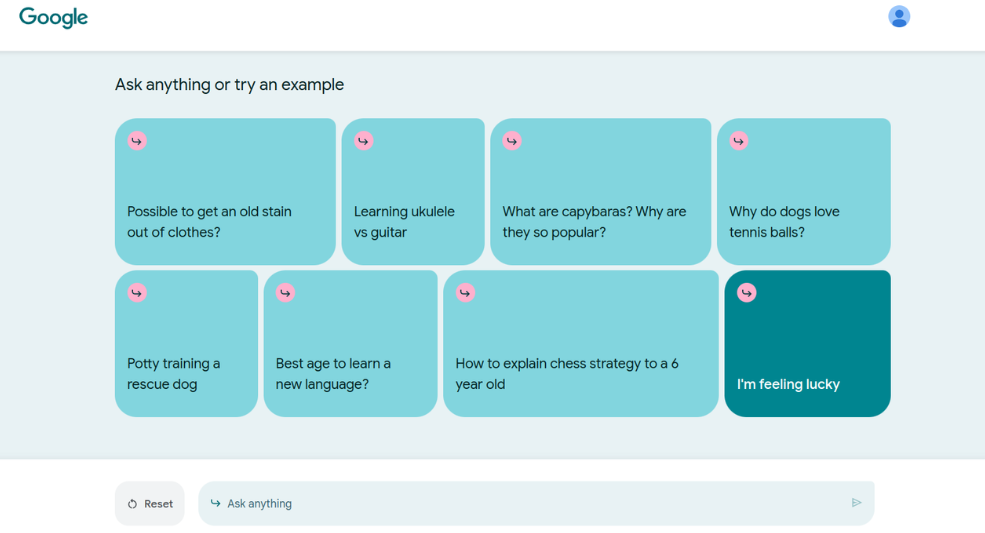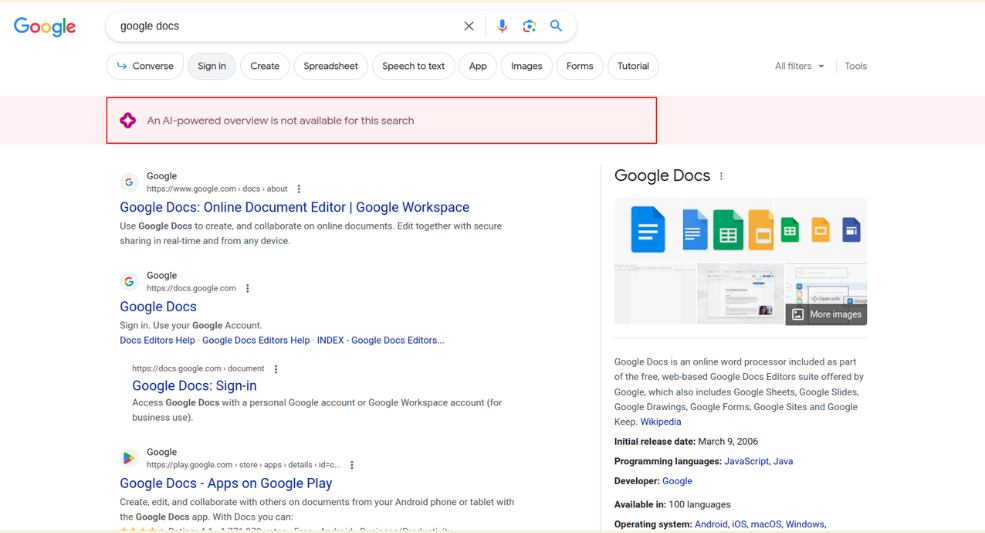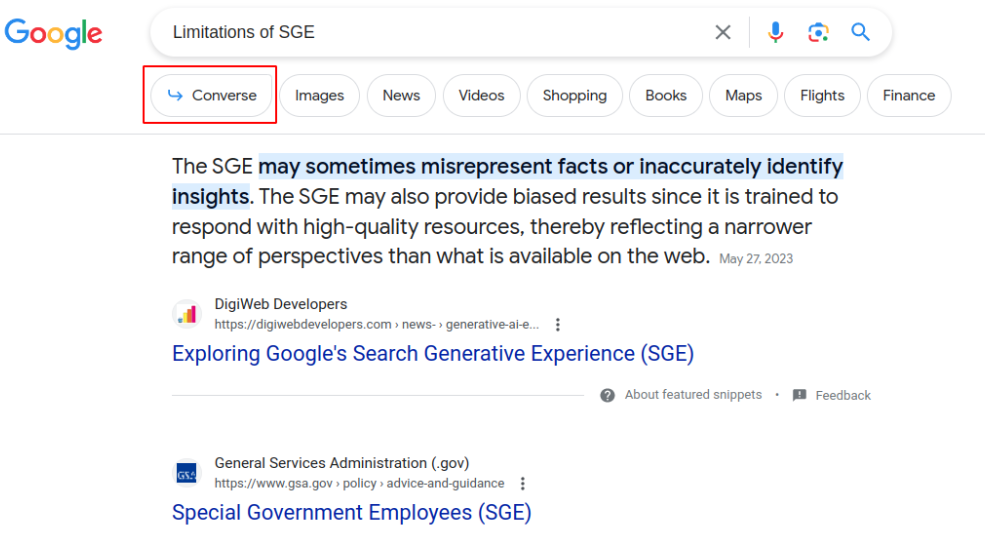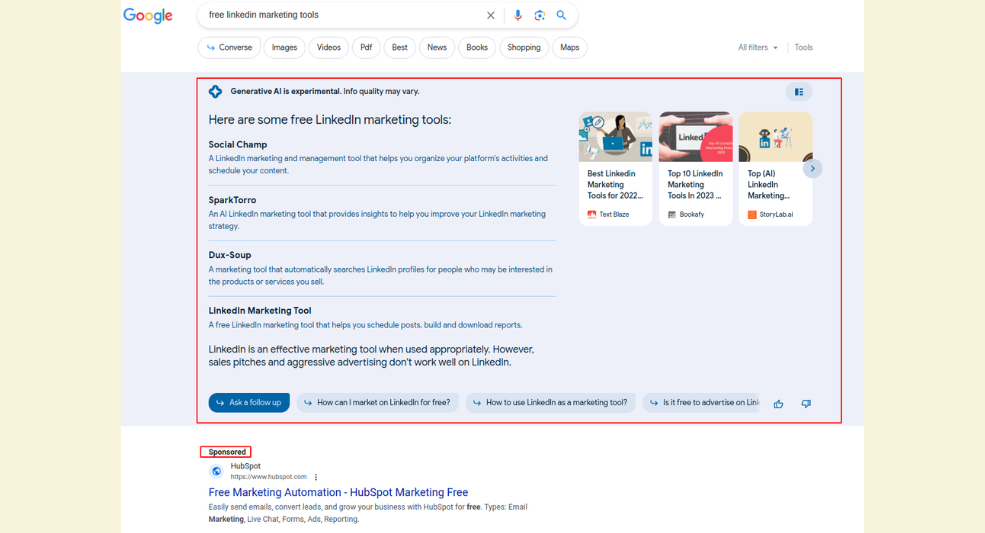Google Search Generative Experience (SGE) is a new way to search that uses generative AI to provide more comprehensive and informative results.
SGE can generate summaries of factual topics, create lists of related products or services, and even write creative text formats, like poems, code, scripts, musical pieces, emails, letters, etc.
Here are some of the benefits of using SGE:
- More comprehensive results: generates summaries of factual topics, creates lists of related products or services, and even writes creative text formats.
- More informative results: provides additional context and detail about the results.
- More engaging results: uses natural language and formatting to make the results more readable and appealing.
It’s currently only in English, but Google has plans to expand language support. However, currently, SGE is in beta testing and isn’t flawless. It may occasionally provide inaccurate information, but Google is actively enhancing its capabilities, making it a promising tool.
If you’re looking for a new and innovative way to search for information, SGE is worth trying.
How Does SGE Work? Unveiling the Secrets
Understanding Your Queries
SGE relies on a powerful language model to grasp the meaning behind your questions. This model has been trained on a vast amount of text and code, allowing it to understand the subtle nuances of human language. For example, if you ask about making a cake, SGE knows you want a recipe, not a dictionary definition. Generating Possible Answers
Once SGE understands your query, it generates a range of potential answers. It uses the language model to create different sentences related to your question. For instance, if you inquire about making a cake, SGE might offer suggestions like:
1. Here’s a recipe for a delicious cake.
2. Check out these helpful tips for baking a cake.
3. Avoid these common mistakes when making a cake.
Selecting the Best Answer
After generating multiple options, SGE selects the best answer based on several factors. It considers the relevance and quality of each response and your past search history. For example, if you often search for recipes, SGE is more likely to present you with a recipe as the top choice.
Displaying the Answer
Once SGE has identified the best answer, it presents it to you in a user-friendly format. You can expect to see the answer displayed as text, in a list, or even in a table. No matter the format, SGE strives to make the information easily accessible and understandable.
Advantages of SGE: Empowering Your Search Experience
Embrace the power of SGE, where comprehensive, informative, and personalized answers await. SGE presents you with an array of benefits that elevate your search experience to new heights:
- Amplified Knowledge: surpasses traditional search engines by offering comprehensive answers. It generates multiple potential responses and selects the most fitting one, empowering you to delve deeper into complex topics.
- Enlightened Insights: unveils a realm of informative answers where details and depth take center stage. It crafts responses that unravel the intricacies of any subject, aiding your understanding of even the most perplexing concepts.
- Captivating Engagement: SGE breathes life into search results, transforming them into engaging narratives. Its ability to provide detailed explanations fosters a seamless comprehension of intricate concepts, making learning a delight.
- Tailored Relevance: caters to your individual interests by considering your past search history. As a result, the answers it presents are more likely to align with your specific preferences, ensuring a more personalized search experience.
- Swift Results: With SGE, answers materialize in the blink of an eye. This efficiency stems from its ability to generate responses directly from a vast language model, bypassing the need to scour the web for information.
- Enhanced Accuracy: SGE’s grasp of query meaning ensures superior precision compared to traditional search engines. It goes beyond surface-level understanding, delivering answers that align precisely with your needs.
SGE: Our Journey of Discovery
SGE stands tall, promising a transformative search experience like no other. It harnesses the power of a vast language model, nurtured by an extensive dataset of text and code, to decipher the complexities of human language with remarkable precision.
Join us as we embark on a voyage of discovery, traversing the realms of SGE’s capabilities.
Sponsored Advertisements:
Putting transactional keywords in the spotlight, sponsored advertisements continue to claim the second position in search results. SGE follows suit, with organic results trailing behind. However, this arrangement may lead to reduced traffic for organic results, posing a drawback for those seeking organic visibility.
SGE-Behaving Like Rich Results:
Just like Rich Results, which are enhanced search results that provide more information and context about a search query,, SGE exhibits similar behavioral patterns. It showcases enhanced snippets of information, providing users with concise and informative responses to their queries.
Chrome’s Conversational Companion:
Chrome introduces a new addition called “Converse,” designed exclusively to display SGE results. This feature seamlessly integrates with the browser, allowing users to explore SGE’s wealth of information effortlessly.
Local Results Making Their Mark:
Thanks to Google’s local-first algorithm, some local results have found their way into SGE. This means that users can now find relevant local information directly within SGE’s search results.
Unveiling Extra Intent:
SGE goes the extra mile to cater to users’ needs by incorporating additional intent covering questions at the bottom of its results. Note that these AI-generated questions aim to address all possible queries a user might have, surpassing the traditional “People Also Ask” format.
User Intent Takes Center Stage:
SGE’s top results are not solely determined by their ranking on the search engine results page (SERP). Instead, the focus is on providing answers that align with user intent. Pages that prioritize addressing user queries effectively earn their place at the top.
Dedicated Tab for SGE Results:
With a dedicated tab for SGE results, users can easily access and explore the wealth of information offered by this dynamic search engine. It functions similarly to an asking Bard but with the added bonus of providing organic search results alongside SGE’s curated responses.

SGE Exceptions:
While SGE is a powerful tool, there are certain queries where it may not be available. For example, as tested by us typing “youtube” or “google docs’ ‘ in the search box does not trigger SGE’s response.

No Direct Response for Certain Queries:
In some cases, SGE might not be directly accessible for certain queries, further highlighting the need for alternative search approaches or exploring different avenues for information retrieval.

AI-Generated Company Information:
SGE takes company information to a new level by incorporating AI-generated details. Users can expect to find reliable and up-to-date information about various companies within SGE’s results.
Conversational Charm of SGE:
It showcases conversational behavior, engaging users in a more interactive and natural manner. It aims to bridge the gap between users and information by providing an intuitive and engaging search experience.
Key Takeaways: Navigating the Transformative Era of SGE
As we navigate this transformative era of search, these insights shed light on the nuances of Google’s Search Generative Experience. Understanding the risks and opportunities presented allows us to adapt our strategies to thrive in this dynamic landscape.
Impactful Traffic Shifts:
The update holds the potential for substantial traffic changes, varying by industry and SEO traffic sources. Different page types face different risks of traffic erosion.
Page Types at High Risk:
Farewell to Listicles: Google’s search now creates its own captivating listicles, rendering the conventional listicle format outdated.
Category Pages Take a Backseat: Category pages are overshadowed as Google introduces its own version directly in search results, resulting in fewer clicks.
Top of the funnel educational content: Anything that can be directly answered by the AI is at risk (for example: “what is,” “how to,” etc.).
Page Types at Medium Risk:
Emphasis on Health in SGE: A Contrast to Finance-related Queries: A captivating observation unfolds as Google embraces the Search Generative Experience (SGE) for numerous health-related subjects, exemplified by its inclusion of “diabetes symptoms” and “tips to reduce blood pressure” in SGE responses.
However, it’s noteworthy that SGE remains absent from finance-related inquiries, such as those pertaining to COVID and RSV. This distinction showcases Google’s strategic focus on health matters while retaining a differentiated approach to finance-related information.
Page Types at Low Risk:
- Embracing Individual Inventory (example: eComm products): Expect a surge in traffic for individual inventory pages, as Google now prioritizes product detail pages (PDPs) over product list pages (PLPs).
- Breaking News Complexity: Summarizing breaking news accurately and quickly poses challenges for AI, maintaining its high-risk status.
- Interaction is Key: Activities requiring user engagement, such as streaming a show or performing specific actions on a website, remain safe from SGE’s grasp.
Highlighting Brands in AI Snapshots:
The AI snapshots mention brands for non-branded queries prominently, emphasizing the significance of brand building.
SGE’s Bias Towards UGC and Forums:
Notably, user-generated content (UGC) and forum sites receive preferential treatment in SGE rankings, even surpassing the leading site in certain cases.
In-Text Links Omitted:
The AI snapshots lack in-text links, although SGE incorporates linking carousels showcasing products and reviews.
Occasional Missteps:
SGE may occasionally provide inaccurate or fabricated information, reminding us of its ongoing development.
Reevaluating Keyword Intent:
Keyword intents demand reconsideration, as SGE responses can differ drastically. For example: “Shopify SEO services” and “hire Shopify SEO services” show 2 completely different SGE responses, while the traditional organic results are almost identical.
Conclusion
Google’s Search Generative Experience (SGE) marks a significant step towards empowering users with personalized search results. By understanding the nuances and implications of SGE, we can better adapt our strategies to harness its potential. The prominence given to health-related topics highlights Google’s strategic focus on providing comprehensive and informative answers in that domain.
Simultaneously, the differentiation in SGE’s approach to finance-related queries reminds us of the dynamic nature of search and the need to stay agile in our efforts as an SEO Agency.
As digital marketers and content creators, it is crucial for us to keep pace with these advancements and optimize our content to align with SGE’s personalized responses. By embracing this transformative era of search, we can ensure that our online presence remains relevant and resonates with users, ultimately driving meaningful engagement and delivering value.
Let us embrace the opportunities that Google’s Search Generative Experience presents and adapt our strategies accordingly to enhance the user experience and achieve our goals in the ever-evolving digital landscape.
FAQs
How long is the SGE beta set to last?
The SGE beta is currently set to last for a limited time. However, Google has not yet announced when the beta will end or when SGE will be released to the public.
How can I get early access to labs and SGE?
There are a few ways to get early access to labs and SGE.
- One way is to sign up for the Google AI newsletter.
- This newsletter will notify you about new labs and features that are available for testing. You can also sign up for the Google AI blog. This blog will provide you with updates on the latest developments in artificial intelligence, including SGE.
- Another way is to sign up and participate in Google’s early access program. This program is open to a limited number of users who are interested in testing new features and providing feedback.
What are the differences between Google AI Search and Bing Chat?
Google AI Search and Bing Chat are two different approaches to natural language search.
- How they work: Google AI Search uses a large language model to understand the meaning of your queries and generate answers from scratch. On the other hand, Bing Chat uses a chatbot to interact with you more naturally.
- Strengths: Google AI Search can provide more comprehensive and informative answers, while Bing Chat can be more engaging and user-friendly.
- Weaknesses: Google AI Search can be slower than traditional search engines, while Bing Chat can be less accurate than traditional search engines.
When will Google SGE be released?
Google has not yet announced when Google SGE will be released. However, the company has said it is still under development and will be released “in the coming months.”
How does Google determine the relevance and display of SGE features?
Google uses a variety of factors to determine the relevance and display of SGE features. These factors might include the meaning of your query, the quality of the answer, and the Bard. Google also uses a machine learning algorithm to learn how to improve the relevance and display of SGE features over time.
What are the limitations of SGE?
SGE is still under development, so there are some limitations to its capabilities. For example, SGE can sometimes be inaccurate, and it can be difficult to get SGE to understand complex queries. However, Google is constantly working to improve SGE, and the company expects that the limitations will be reduced over time.
What are the ethical concerns surrounding SGE?
There are some ethical concerns surrounding the development and use of SGE. For example, some people worry that SGE could be used to spread misinformation or to manipulate people. However, Google has said that it is committed to using SGE in a responsible way, and the company has developed a set of ethical guidelines for the development and use of SGE.



